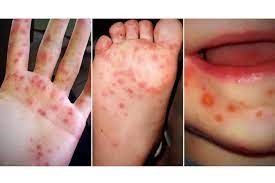
In Malaysia, Hand-Foot-Mouth Disease (HFMD) is a common childhood illness caused by a virus. It easily spreads from person to person (contagious) when someone comes in contact with the body fluids of an infected person. This can happen by touching something that has been sneezed, coughed or drooled on.
Individuals with Hand-Foot-Mouth Disease (HFMD) can be contagious during the incubation period (about three to six days) before symptoms develop and may remain contagious for days or weeks after the symptoms and signs abate.
The first signs of Hand-Foot-Mouth Disease (HFMD) can be:
Hand-Foot-Mouth Disease is spread when poor hand washing after a diaper change, or contact with saliva, which allows the virus to be passed from one child to another. Within about four to six days of acquiring the virus, an infected child may develop a relatively low-grade fever, ranging from 99 to 102°F (37.2–38.9°C). Other symptoms include fatigue, loss of energy, decreased appetite, skin rash, and a sore sensation in the mouth that may interfere with feeding.
After one to two days, fluid-filled bumps (vesicles) appear on the inside of the mouth, along the surface of the tongue, on the roof of the mouth, and on the insides of the cheeks. These are tiny blisters, about 3–7 mm in diameter. Eventually, they may appear on the palms of the hands and on the soles of the feet. Occasionally, these vesicles may occur in the diaper region.
The vesicles in the mouth cause the majority of discomfort, and the child may refuse to eat or drink due to painful mouth sores. This phase usually lasts for an average of a week or more if the child has a weakened immune system. As long as the bumps have clear fluid within them, the disease is at its most contagious. The fluid within the vesicles contains large quantities of the causative viruses. Extra care should be taken to avoid contact with this fluid.
Diagnosis is made by most doctors solely on the basis of the unique appearance of blisters of the mouth, hands, and feet, in a child not appearing very ill.
There is no treatment available to cure or decrease the duration of the disease. Medications like paracetamol may be helpful for decreasing pain and helping the child to eat and drink. Oftentimes, your doctor may prescribe throat spray to relieve the pain.
It is important to try to encourage the child to take in adequate amounts of fluids, in the form of ice chips or Popsicles if other foods or liquids are too uncomfortable. There is a risk of developing dehydration.
Parents should be aware of the characteristic rash of Hand-Foot-Mouth Disease (HFMD) and monitor their children, especially if they are in a childcare setting. Good hygiene practices should be strictly followed to prevent the spread of the disease.
In Malaysia, Hand-Foot-Mouth Disease (HFMD) is easily passed on to other people. It spreads in coughs, sneezes, poo, and the fluid in the blisters.
You can start spreading it from a few days before you have any symptoms, but you are most likely to spread it to others in the first 5 days after symptoms start.
According to the Ministry of Health of Malaysia (Kementerian Kesihatan Malaysia), there are a few ways to reduce the risk of spreading hand, foot, and mouth disease:
Keep your child off school or nursery while they are feeling unwell. But as soon as they are feeling better, they can go back to school or nursery. There is no need to wait until all the blisters have healed. Keeping your child away from other children for longer is unlikely to stop the illness spreading.
Although there is usually no risk to the pregnancy or baby, it is best to avoid close contact with anyone who has Hand-Foot-Mouth Disease (HFMD).
This is because:
Speak to your doctor if you have been in contact with someone with hand, foot, and mouth disease (HFMD). If you or your child experience symptoms such as a fever or sore throat, stay home from school or work. It is best to avoid contact with others once the blisters and rashes develop. This can help you avoid spreading the disease to others.

Wait a minute

Wait a minute